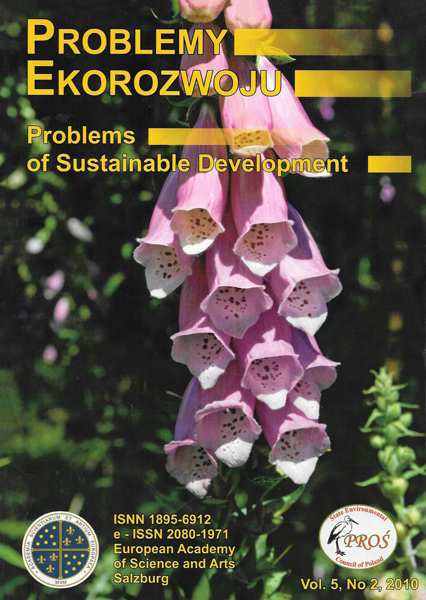Triple Bottom Line Approach to Individual and Global Sustainability
Article Sidebar
Open full text
Issue Vol. 5 No. 2 (2010)
-
Is Development of Nowadays World Sustainable?
Lucjan Pawłowski9-12
-
Global Warming: The Origin and Nature of the Alleged Scientific Consensus
Richard S. Lindzen13-28
-
Triple Bottom Line Approach to Individual and Global Sustainability
G. Venkatesh29-37
-
Socio-Economic Aspects of Sustainable Development on Global and Local Level
Arkadiusz Tuziak39-49
-
Methodology and Key Issues of ISSP Environment Research Project from Sustainable Development Perspective
Paweł Rydzewski51-60
-
The Ecology of Silence as an Element of Systemic Sozology Which Enriches the Conception of the Sustainable Development
Wiesław Sztumski61-68
-
Philosophy of Sustainable Development – Preliminaries
Leszek Gawor69-76
-
Environmental Competitiveness of Regions – Attempt of Conceptualization
Armand Kasztelan77-86
-
Ecological Education for Sustainable Development – Theory and Practise
Agnieszka Hłobił87-94
-
Needs and Conditions of Education for Sustainable Development in Poland
Małgorzata Grodzińska-Jurczak, Ewa Gajuś-Lankamer, Anna Wójcik, Agata Pietrzyk95-106
-
Polish Society Facing Idea and Principles of Sustainable Development
Artur Bołtromiuk107-116
-
Contemporary Conditions of Socio-economic Development (Synthetics Approach)
Barbara Piontek117-124
-
Recycling of Construction Waste in Terms of Sustainable Building
Janusz Adamczyk, Robert Dylewski125-131
-
Information, Vatican: Current Crisis Calls for World Financial Reorganisation
Vatican Information Service133-134
-
Book Review: B. Latour, Polityka Natury, Wydawnictwo Krytyki Politycznej, Warszawa 2009
Zdzisława Piątek135-139
-
Book Review: W. Bojarski, Gospodarka i Państwo dla Społeczeństwa, Warszawa 2009
Lesław Michnowski140-148
-
Letter to the Editorial Office: Can Gene-centred View Demote Man?
Zdzisława Piątek149-154
-
Letter to the Editorial Office: Eco-efficiency for Sustainability: the Challenge Investigated at the 3rd Eco-Efficiency Conference, 9-11 June 2010
Gjalt Huppes, Masanobu Ishikawa155-156
-
Letter to the Editorial Office: A Revolution of the Middle… and the Pursuit of Happiness: Information About the Book
John Ikerd156-157
-
Letter to the Editorial Board: Sustainable Development Viewed Through Student Fieldwork, Focusing on Environmental and Socio-economic Issues: A Case Study from Scotland
Kevin R. Butt, Joanna Kostecka157-159
-
Communiques on Activities of the State Environmental Council of Poland
Tomasz Winnicki163-172
Archives
-
Vol. 7 No. 2
2012-07-02 14
-
Vol. 7 No. 1
2012-01-02 12
-
Vol. 6 No. 2
2011-07-01 19
-
Vol. 6 No. 1
2011-01-03 18
-
Vol. 5 No. 2
2010-07-01 21
-
Vol. 5 No. 1
2010-01-04 16
-
Vol. 4 No. 2
2009-07-01 19
-
Vol. 4 No. 1
2009-01-05 22
-
Vol. 3 No. 2
2008-07-01 19
-
Vol. 3 No. 1
2008-01-02 12
Main Article Content
Authors
venkatesh.govindarajan@ntnu.no
Abstract
Industrial ecology is founded on analogies and lateral thinking, borrowing and adapting, and opening up the frontiers of imagination and innovativeness to make the road to sustainable development more tractable. Talking of the key role mankind needs to play to make sustainable development a reality, a wonderful analogy is uncovered – between holistic individual human development and the triple bottom line approach (economic, social and environmental) to sustainable progress of humanity as a whole on the surface of the earth. An individual starts off from gross materialism (body) but needs to aim for the right blend of physical, emotional and spiritual advancement in life. When all individuals do so, a lop-sided socio-economic techno-sphere will gradually metamorphose into a fully-evolved one. Paradoxically, individuals need to delve in and comprehend their spiritual selves, for the technosphere to fan out and embrace the earth of which it is just a small component.
Keywords:
References
The Bhagavad Gita, Interpretation by Swami Chinmayananda.
CLARK RW., Einstein - The Life and Times, Avon Books, HarperCollins 1972.
DAS JN., 2005, Simple Living and High Thinking, Bhaktivedanta Ashram, http://www.bvashram.org.
DELIO I., 2008, Is Spirituality the Future of Theology: Insights from Bonaventure, in: Spiritus 8, p. 148-155.
DEMPSEY C J., 2004, Book Review, in: Spiritus 5.1.
GANESH N., 2008, Change is Constant, in: The Times of India, Dec 28, 2009.
GIDDIIDDINGS B, HOPWOOD B., O’BRIEN G., 2002, Environment, Economy and Society: Fitting Them Together Into Sustainable Development, in: Sustainable Development, vol. 10, issue 4, p. 187-196.
GRAM-HANSSEN K., 2007, Teenage Consumption of Cleanliness: How to Make it Sustainable in: Sustainability: Science, Practice, & Policy, vol. 3, issue 2, p. 15-23.
GREY M C., Sacred Longings: The Ecological Spirit and Global Culture, Fortress Press, Minneapolis 2004.
GUGGEHEIM D., An Inconvenient Truth (the movie), Participant Productions, Paramount Classics, 2006.
The Holy Bible – The New Testament.
ISLAM S., Ramadan – Lessons to Learn, Meanings to See, in: Reading Islam, ‘Mercy for all’ Endowment, Qatar, http://www.reading islam.com (1.03.2010).
JUNG L.S., Food for life: The spirituality and Ethics of Eating, Fortress Press, Minneapolis 2004.
KEMP R, MARTENS P., 2007, Sustainable Development: How to Manage Something that is Subjective and Never Can be Achieved, in: Sustainability: Science, Practice & Policy, vol. 3, issue 2, p. 5-14.
RAJESWAR J., 2001, Conservation Ethics Versus Development: How to Obviate the Dichotomy, in: Sustainable Development, vol. 9, issue 1, p. 16-23.
SWAMI VIVEKANANDA, 1896, The Necessity of Religion, Transcript of Lecture Delivered in London, Vivekananda Vedanta Network, http://www.vivekananda.org.
VENKATESH G., 2006, The Meek Shall Save the Earth, http://www.eco-web.com.
Article Details
Abstract views: 70
License

This work is licensed under a Creative Commons Attribution-ShareAlike 4.0 International License.


